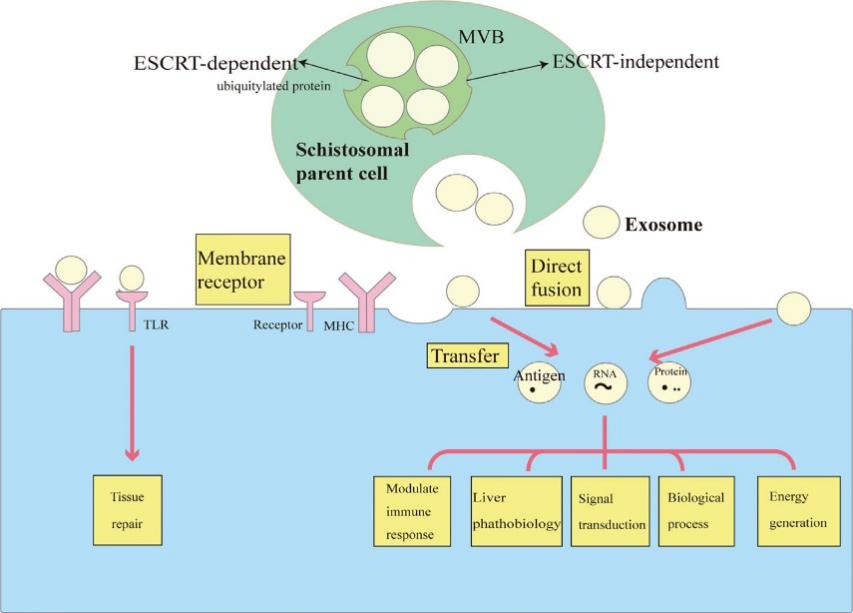Parasitic Infections Diagnosis-Applied Exosomes
Exosomes are nanoscale vesicle-like bodies secreted by a variety of cells, containing proteins, nucleic acids, lipids, enzymes, and other bioactive components. These bioactive components in exosomes play an important role in the transmission of substances and information between cells. At present, a large number of studies have found that parasites can use various mechanisms to release exosomes and widely deliver their own active substances. When invaded by parasites, host cells will also produce exosomes to deal with parasite infection. In addition, exosomes produced by parasites and host cells during parasite infection carry a variety of specific bioactive molecules, which play an important role in parasite infection and immune regulation. These various specific bioactive molecules in exosomes are expected to become biomarkers for the diagnosis and prognosis of parasitic infectious diseases. Creative Biolabs can provide the most comprehensive exosome sequencing services, including exosomal proteome sequencing, exosomal whole transcriptome sequencing, exosomal miRNA sequencing, exosomal lncRNA sequencing, exosomal circRNA sequencing, etc., to help you mine the most valuable exosomes Information.
The Role of Exosomes in the Parasitic Infections
-
The Role of Parasite-derived Exosomes in Parasitic Infections
A large number of studies have found that exosomes derived from parasites not only contain parasite-specific bioactive molecules that promote the further spread and spread of parasites but also contain many factors that can regulate host gene expression and immunity. For example, the CPN10 protein in Leishmania exosomes can migrate into the cytoplasm of host macrophages and release toxic factors. These toxic factors negatively regulate the rate of parasite uptake by macrophages and some macrophage proteins involved in innate immunity, thereby suppressing the immune response of the host cell.
-
The Role of Host Cells-derived Exosomes in Parasitic Infections
Parasites can not only produce exosomes by themselves but also stimulate host cells to produce exosomes by infecting host cells. These host-derived exosomes also play an important role in parasites' survival and host immune regulation. Exosomes secreted by host cells infected with parasites can propagate the infection state, leading to enhanced host immune responses. It has been found that exosomes produced by red blood cells infected with Plasmodium are phagocytized by monocytes, which can promote the dose-dependent secretion of pro-inflammatory cytokines IL-1β, IL-6, and IL-12 in monocytes.
Potential of Exosomes as Diagnostic Markers for Parasitic Infections
Since exosomes widely exist in body fluids such as blood, urine, saliva, amniotic fluid, and breast milk, and exosomes contain abundant parasite-specific molecules and specific molecules that can characterize the state of parasite infection, these molecules have the potential for diagnosis and prognosis of parasitic infections. For example, the expression levels of most miRNAs in serum-derived exosomes from patients infected with Schistosoma were significantly higher than those in the uninfected group. Through exosome proteome sequencing, there were 49 specifically expressed proteins in the exosomes derived from the serum of patients infected with E. granulosus, of which 4 proteins were derived from parasites. These data suggest that nucleic acids or proteins in host-derived exosomes will have important clinical application prospects as diagnostic markers for parasitic diseases.
 Fig.1 The biology and functions of exosomes in schistosomiasis.1,2
Fig.1 The biology and functions of exosomes in schistosomiasis.1,2
Creative Biolabs has extensive experience in exosome extraction and analysis. We can provide the most suitable exosome extraction service, exosome identification service, and exosomal content analysis service according to customer needs. If you want to find the most promising biomarkers in exosomes, please contact us to formulate a satisfactory experimental plan for you to accelerate your research progress.
References
-
Yuan, Y.; et al. Understanding the pathophysiology of exosomes in schistosomiasis: a new direction for disease control and prevention. Frontiers in Immunology. 2021, 12:634138.
-
under Open Access license CC BY 4.0, without modification.
For Research Use Only. Cannot be used by patients.
Related Services:

 Fig.1 The biology and functions of exosomes in schistosomiasis.1,2
Fig.1 The biology and functions of exosomes in schistosomiasis.1,2









